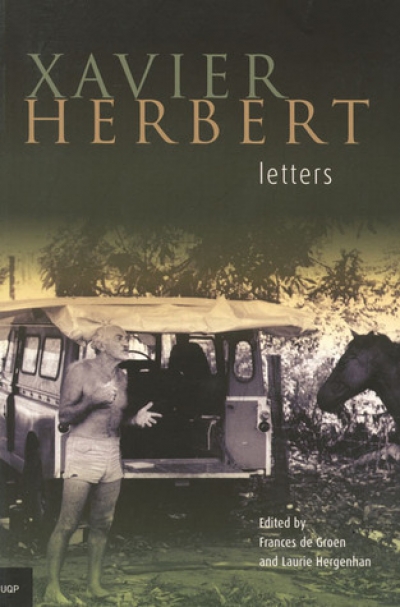Letters
Sign up to From the Archive and receive a new review to your inbox every Monday. Always free to read.
Recent:
Dear Editor,
Kerryn Goldsworthy’s valuable piece on the early years of ABR (‘The Oily Ratbag and the Recycled Waratah’, ABR, April 2003), giving details of Australian Book Review under Max Harris and Rosemary Wighton from 1961 to 1973, does not mention what caused its disappearance from 1973 to 1978, when John McLaren and the National Book Council revived it. Perhaps it is time for the explanation to be given.
... (read more)ABR welcomes concise and pertinent letters. Correspondents should note that letters may be edited. Letters and e-mails must reach us by the middle of the current month, and must include a telephone number for verification.
Pushing ahead
Dear Editor,
Beverley Kingston has written a rather world-weary review of my book The Commonwealth of' Speech (ABR, December 2002/January 2003). I read it not long after writing to a senior person at my university complaining about the quaint attitude which central committees in the university world seem to take to the Humanities. Much of what I said to him can be recycled as a response to the review.
... (read more)ABR welcomes concise and pertinent letters. Correspondents should note that letters may be edited. They must reach us by the middle of the current month. Letters and emails must include a telephone number for verification
... (read more)Xavier Herbert: Letters edited by Frances de Groen and Laurie Hergenhan
ABR welcomes concise and pertinent letters. Correspondents should note that letters may be edited. They must reach us by the middle of the current month. Letters and emails must include a telephone number for verification
Poetry at the Melbourne Writers’ Festival
Dear Editor,
Juno Gemes asks what is the current place of poetry within our literary festivals (ABR, ‘Letters’, September 2002). She also asks related questions, which in summary give the overall impression that poetry, particularly at the Melbourne Writers’ Festival, now has only a peripheral place. As evidence, she claims that in Melbourne ‘a mere five poets, including only one indigenous writer, will take part in five sessions in a programme representing hundreds of writers’.
... (read more)ABR welcomes concise and pertinent letters. Correspondents should note that letters may be edited. They must reach us by the middle of the current month. Emailed letters must include a telephone number for verification.
Inga Clendinnen responds to John Hirst
Dear Editor,
I want to respond to John Hirst’s rather avuncular dismissal of Rosemary Neill’s White Out (ABR, August 2002). John is an old friend, and I have often relied on his goodwill and good sense, but I disagreed with just about every sentence of his evaluation of O’Neill’s excellent book. In fact, I think his review exemplifies the kind of predetermined politicised response that Neill and other engaged analysts of the Aboriginal condition are up against. Some Aborigines and whites have been ‘speaking the truth’ about the devastating disintegration of some Aboriginal communities for years. What is ‘new’ is that more of us are beginning to turn from our absorbing in-house squabbles to listen to what they are saying. We are being made to hear that the earnest diagnoses and recommendations we have been making over the last three decades appear to be mistaken. It is not only that Aborigines are dying earlier. Now they are suffering more before they die.
... (read more)ABR welcomes concise and pertinent letters. Correspondents should note that letters may be edited. They must reach us by the middle of the current month. Emailed letters must include a telephone number for verification.
... (read more)ABR welcomes concise and pertinent letters. Correspondents should note that letters may be edited. They must reach us by the middle of the current month. Emailed letters must include a telephone number for verification.
... (read more)ABR welcomes concise and pertinent letters. Correspondents should note that letters may be edited. They must reach us by the middle of the current month. Emailed letters must include a telephone number for verification.
Responses to Peter Craven
Dear Editor,
I expected a spray from Peter Craven in response to my review of The Best Australian Stories 2001, but such a display of self-importance from an editor and critic is alarming (‘Letters’, ABR, March 2002). I had imagined he would be willing to reflect on the poor reviews he received for the latest volumes of Best Essays and Best Stories and to consider the possibility that plumping up the books with samples of writing not yet ready for publication is not working.
... (read more)ABR welcomes concise and pertinent letters. Correspondents should note that letters may be edited. They must reach us by the 15th of the current month. Emailed letters must include a telephone number for verification.
Peter Craven responds to Hilary McPhee
Dear Editor,
As someone whose business it is to dish out criticism of books when required, I am not in the habit of replying to criticism. Recently, a journalist has suggested that I be put out to pasture as the editor of The Best Australian Essays annual I brought into being, and an academic has disputed my right to introduce the Quarterly Essays I commission. These are not, to my mind, happy or wise suggestions, but one can’t complain – they come with the territory. I edit the major collections of fiction and non-fiction that appear in this country. I also edit a series of more or less political pamphlets that have received their fair share of attention. On top of that, I have published a great deal of literary criticism in the press over the last however many years, some of it, by necessity, scathing. I am bound to have displeased and wearied all sorts of splendid people over that time.
... (read more)

